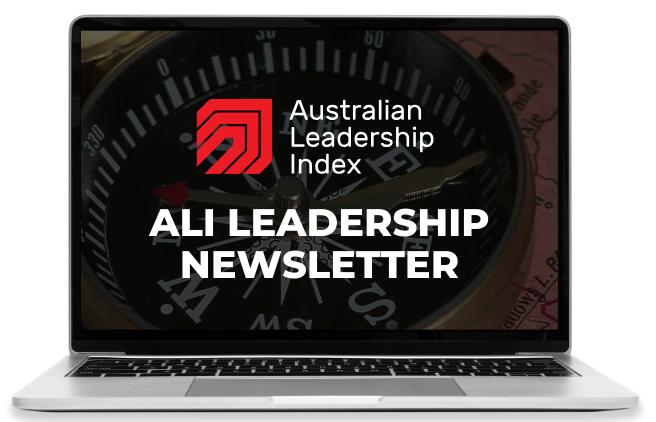About ALI
Why does the ALI exist?
The Australian Leadership Index (ALI) was created to improve leadership by tracking how Australians view leaders and reporting the results publicly.
About the index
The index provides a way to measure how people view the performance of leaders and their institutions, when it comes to their overall leadership, and its drivers.
At a macro level, institutions have a duty, not only to cultivate their own institutional values, character, and performance, but to serve the broader public interest and generate public value.
As such, when we talk about and measure perceptions of ‘leadership’, we are referring to judgements made about an institution’s:
- Leadership performance, in general
- Leadership for the greater good
- Creation of public value
Overall perceptions of leadership are driven by a number of more granular judgements that people make about an institution’s perceived values, behaviours, and policies.
Our research and statistical modelling has revealed that leadership judgements are formed on the basis of three distinct factors, each with their own set of criteria: integrity, contribution, and competence.
Integrity
- Transparency
- Genuineness
- Honesty
- Dependability
- Reliability
- Legitimacy
- Accountability
- Ethicality
- Fairness
- Care for community
- Trustworthiness
- Responsibility
Contribution
- Financial outcomes
- Employment opportunities
- Tech innovation
- Knowledge production
- Educating people
- Health and wellbeing
- Societal welfare
- Cultural inclusion
- Environmental sustainability
- Environmental impact
Competence
- Clear purpose
- Clear vision
- Demonstrates skill
- Reliable decision making
- Efficiency
- Citizen engagement
- Governance
- Stakeholder value
- Stakeholder satisfaction
- Accessibility
- Responsiveness
The Australian Leadership Index was founded on the principle that leadership should come from institutions across all sectors. As a result, a wide range of institutions across the government, public, private and not-for-profit sectors are measured and tracked over time, providing a comprehensive and ongoing picture of the state of leadership in Australia.
Government Sector
- Federal government
- State governments
- Local governments
Public Sector
- Higher education
- Public health
- Law enforcement
- Public postal services
- Aged care
- Emergency services
Private Sector
- Banking and finance companies
- Insurance companies
- Retail companies
- Mining companies
- Supermarkets and grocery stores
- Telecommunications companies
- Media companies
- Utility companies
- Technology companies
- Leisure and gaming companies
- Pharmaceuticals companies
- Travel and tourism companies
Not For Profit Sector
- Charities
- Trade unions
- Religious institutions
- Professional sporting clubs or organisations
To calculate the score for each metric, we take the mean from an 11 point scale (0-10) and convert it to a score ranging from 0-100.
This gives us a score which represents how people rate the performance of an institution on a particular component of leadership.
Scores closer to 100 represent strong performance, while scores closer to zero represent poor performance.
For each institution and sector, we also report the gap between the insitution or sector score, and the unfiltered national score. This provides a benchmark for institution and sector performance, and allows us to identify institutions and sectors that are performing or underperforming.
The results and findings from the Australian Leadership Index are reported in a number of ways.
Online dashboard. Our publicly accessible online dashboard allows users to explore the key findings and results from the survey. It caters for a range of analytic skills, from the general public to data analysts and researchers.
Scholarly and media articles. Articles on various leadership issues are published regularly through our reports page. Articles range from explainers about the study to analyses of leadership scores in response to current and topical events. Users can subscribe to receive email notifications each time an article is published.
Annual and deep dive reports. The Swinburne University research team releases annual reports and occasional deep dive reports, providing a comprehensive analysis of how leadership perceptions change in response to various events, over time, and across sectors and institutions.
Stay informed about leadership in Australia
Subscribe to the ALI to receive the monthly leadership newsletter and access our downloadable reports.
SubscribeData collection
The index continuously collects survey responses from a nationally representative sample of Australians, asking people to rate the leadership of key institutions.
The Australian Leadership Index survey is collected continuously throughout each month. This allows us to measure and report on how leadership perceptions change in response to real world events.
Our sample of n=1,000 people per quarter (n=4,000 per year) is nationally representative by age, gender, and state. Data is also statistically weighted to ensure full representativeness.
The leadership index is administered via an engaging and interactive online survey. Each participant is asked to rate the performance of 4 randomly assigned institutions (from a list of 25) on leadership and its key drivers, integrity, contribution, and competence.
We collect extensive profiling information about each participant who completes the survey. This allows us to report on how various sub-groups within the Australian population feel about leadership, and compare results between them.
Research team
The project team comprises researchers with expertise in leadership, large-scale survey design and administration, and advanced data analytics.

Dr Samuel Wilson
Associate Professor, Leadership
Sam has a PhD in social psychology from the University of Melbourne and is a registered psychologist. He teaches leadership development to postgraduates in the Australian Graduate School of Entrepreneurship and conducts research with a range of industry groups. His research interests span national studies of leadership for the greater good to psychological studies of humanitarianism.

Dr Vlad Demsar
Senior Lecturer, Marketing
Vlad has a PhD in marketing from Monash University. He teaches Digital Marketing to postgraduates in the Australian Graduate School of Entrepreneurship and conducts research with industry partners in a range of sectors and industries. His research interests lie in understanding consumer culture, consumer behaviour, advertising, subversion, digital strategy, and social media crisis management.

